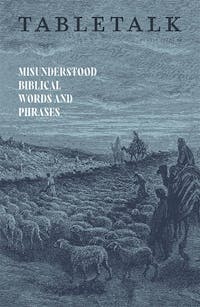
Request your free, three-month trial to Tabletalk magazine. You’ll receive the print issue monthly and gain immediate digital access to decades of archives. This trial is risk-free. No credit card required.
Try Tabletalk NowAlready receive Tabletalk magazine every month?
Verify your email address to gain unlimited access.
Scripture makes clear that Christians are to be the salt and light of the world. Exactly how, though, do we carry that out?
Though we are not saved by our good works, the Bible teaches that God expects them from Christians. What, exactly, does He want us to do, and where does He want us to do it? According to Scripture, God providentially governs and cares for His entire creation. How does that play out in human societies, given the reality of sin?
Today, in our highly secularized world, Christians also face other questions: Should Christians get involved in politics? How can Christians recover Christian marriage? How should Christian parents raise their children? How can Christians live out their faith in the workplace? One central theme of the Reformation goes a long way in answering these questions: the doctrine of vocation.
live as you were called
As has happened with other theological terms, the word vocation has been taken over into secular vernacular and given a much-restricted meaning, becoming a synonym for job or occupation. Christians, too, have absorbed that secular meaning, so the assumption is often that the doctrine of vocation has to do with how Christians can glorify God in their work.
The theological concept includes that, but the doctrine of vocation—as developed by Martin Luther, John Calvin, the Puritans, and other Reformation theologians—is much more. It amounts to a theology of the Christian life or, put another way, a theology of how to live in the world.
The word vocation simply means “calling” or a “call,” so passages that use these terms teach us about vocation. For example, in 1 Corinthians 7, the Apostle Paul uses various derivatives of “calling,” culminating in this key text: “Only let each person lead the life that the Lord has assigned to him, and to which God has called him. This is my rule in all the churches” (1 Cor. 7:17).
God assigns us a life, and then God calls us to that life. This is the doctrine of vocation in a nutshell. Notice that nothing is said about choosing a vocation or finding your true vocation or being fulfilled in your vocation. We may experience or struggle with all that, but vocation is fundamentally God’s doing.
In context, the Apostle Paul in 1 Corinthians 7 is talking mostly about the vocation of marriage. Is it better to get married or remain single? He also addresses the question of ethnic and national identity, whether it is better to be a Jew or a gentile. He also addresses the Greco-Roman economic system, whether one can be a Christian and a slave and whether it is permissible to seek freedom. Looming behind all these “callings” is the call to salvation, in which the Word of God calls individuals through the gospel and creates faith in their hearts.
These passages thus address what Luther called the various “estates” that God has designed for human life, in which we have our multiple callings: the household, the state, and the church.
In each case, for all the questions raised in 1 Corinthians 7, Paul’s answer is the same: “Live as you were called.”
what god is doing through your life
We might ask, “What is God doing in my life?” Vocation encourages us to ask another question: “What is God doing through my life?”
God providentially governs and cares for His human creation, among other means, by vocation. He gives us our daily bread through the vocation of farmers, millers, and bakers (see 2 Cor. 9:10). He protects us through the vocations of the governing authorities, including those who “bear the sword,” such as police officers, soldiers, and judges (see Rom. 13:1–7). He creates and cares for children through the vocation of mothers and fathers (see Ps. 127). He proclaims and teaches His Word through the vocation of the ministry (Rom. 10:14–17).
Luther described vocation as a “mask of God.” Consider everyone who does things for you—the people who built your house, made your clothes, manufactured your car, cleaned up after you, served your meal, cured your diseases, and on and on. Behind these ordinary folks, God is hidden, and He blesses you through them.
You, too, are a mask of God. He is blessing others through you, even though you might not be aware of it: your spouse, your children, your colleagues, your customers, your fellow Christians.
god’s purpose for all vocations
God desires us to love Him and to love our neighbors as ourselves (Matt. 22:34–40). Therefore, the purpose of every vocation—in marriage, parenthood, the workplace, the nation, and the church—is that we love and serve our neighbors (see Gal. 5:13–15).
Each vocation brings neighbors into our lives. Marriage gives us our spouse; parenthood, our children; the workplace, our colleagues and customers; our nation, our fellow citizens; our church, the members of our congregation. These are the neighbors whom God wants us to love and serve. When we do, our love and service become a channel for God’s love and service.
To be sure, we often fail to love these neighbors. We sometimes use, even mistreat them. Instead of serving them, we want them to serve us. This is the root of conflict in marriages, businesses, and congregations. This is to say, we sin in our vocations. God may continue to work through us, but we are fighting Him.
We must confess those sins, receive forgiveness, and make things right. And when we do, we grow in faith and love. Sanctification is also found in vocation.
